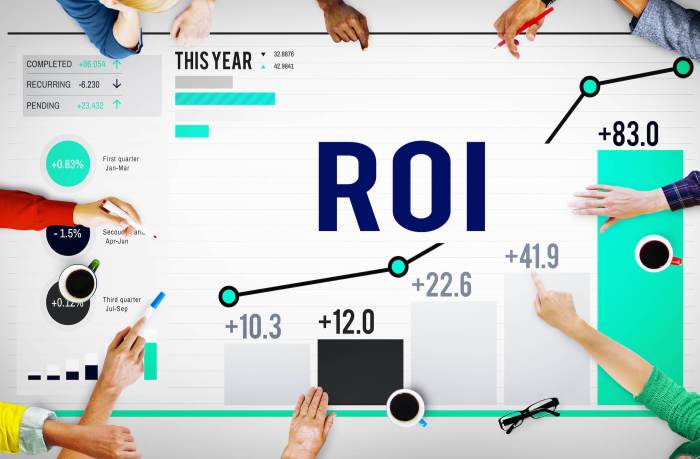Tracking Content Marketing ROI is crucial for businesses looking to measure the effectiveness of their campaigns and make data-driven decisions. Dive into this guide to discover how ROI tracking can elevate your content marketing strategies to new heights.
Importance of Tracking Content Marketing ROI
Tracking ROI in content marketing is crucial for understanding the effectiveness of your campaigns and ensuring that you are getting the best return on your investment. By monitoring ROI, businesses can make data-driven decisions, optimize their strategies, and allocate resources more efficiently.
Benefits of Monitoring ROI for Content Marketing Strategies
- Identifying the most successful content: Tracking ROI helps businesses understand which pieces of content are resonating with their audience and driving conversions. This data can inform future content creation and distribution strategies.
- Improving campaign performance: By analyzing ROI metrics, businesses can identify areas for improvement in their content marketing campaigns. This could involve adjusting targeting, messaging, or distribution channels to increase ROI.
- Maximizing budget allocation: Tracking ROI allows businesses to allocate their budget more effectively by focusing on content initiatives that deliver the highest return. This can help prevent wastage of resources on underperforming campaigns.
Examples of How Tracking ROI Can Help Optimize Content Campaigns
- Conversion Rate Optimization: By analyzing ROI data, businesses can identify which content types or topics are driving the most conversions. This information can be used to create more targeted and compelling content that resonates with their audience.
- Channel Performance Analysis: Tracking ROI across different marketing channels can help businesses identify which platforms are delivering the best results. This allows for optimization of channel-specific strategies to maximize ROI.
- Content Personalization: ROI tracking can provide insights into audience preferences and behaviors. This data can be used to personalize content to better meet the needs and interests of target customers, ultimately driving higher ROI.
Metrics for Tracking Content Marketing ROI

When it comes to measuring the success of your content marketing efforts, there are several key metrics that can help you determine the return on investment (ROI). Understanding these metrics is crucial for optimizing your content strategy and maximizing your marketing budget.
Conversion Rates
- Conversion rates are one of the most important metrics for tracking content marketing ROI. They indicate the percentage of website visitors who take a desired action, such as making a purchase or signing up for a newsletter, after engaging with your content.
- By tracking conversion rates, you can assess the effectiveness of your content in driving valuable actions and conversions, ultimately helping you understand the impact of your content on your bottom line.
Customer Acquisition Costs
- Customer acquisition costs (CAC) are another essential metric for measuring content marketing ROI. CAC represents the total cost incurred to acquire a new customer, including marketing expenses and sales efforts.
- By analyzing CAC in relation to the revenue generated from content marketing, you can determine the cost-effectiveness of your campaigns and make informed decisions about resource allocation and budget allocation.
Engagement Metrics
- Tracking engagement metrics, such as social shares, likes, comments, and time spent on page, is crucial for understanding how your audience interacts with your content.
- Engagement metrics provide valuable insights into the effectiveness of your content in capturing and retaining audience attention, as well as driving brand awareness and loyalty.
Tools and Software for Tracking Content Marketing ROI

In the world of content marketing, tracking ROI is crucial to measure the success of your campaigns and make informed decisions for future strategies. There are several tools and software available that can help you analyze and track the performance of your content marketing efforts. Let’s take a look at some popular options and compare their features, usability, and cost-effectiveness.
1. Google Analytics
Google Analytics is a powerful and widely used tool for tracking website traffic, user behavior, and conversion rates. It provides detailed insights into how your content is performing, allowing you to measure the ROI of your content marketing campaigns. With features like goal tracking, conversion tracking, and custom reporting, Google Analytics is a comprehensive tool for analyzing the impact of your content.
2. HubSpot
HubSpot offers a suite of tools for inbound marketing, including content creation, email marketing, and social media management. Their analytics platform allows you to track the performance of your content marketing efforts, measure ROI, and optimize your strategies for better results. HubSpot’s user-friendly interface and robust reporting capabilities make it a popular choice among marketers.
3. SEMrush
SEMrush is an all-in-one marketing toolkit that offers tools for , PPC, content marketing, and more. With features like research, backlink analysis, and content audit, SEMrush provides valuable insights into the performance of your content and helps you track ROI effectively. The platform’s competitive analysis tools also allow you to benchmark your performance against competitors.
4. Buffer
Buffer is a social media management platform that helps you schedule posts, analyze performance, and track ROI for your social media campaigns. With features like social media analytics, engagement metrics, and conversion tracking, Buffer enables you to measure the impact of your content on social platforms and make data-driven decisions to improve your results.
5. CoSchedule
CoSchedule is a content marketing calendar and workflow management tool that also offers analytics and reporting features. With CoSchedule, you can track the performance of your content, measure ROI, and collaborate with team members to optimize your content strategy. The platform’s integration with popular tools like Google Analytics and social media platforms makes it a convenient option for marketers.
Overall, each of these tools has its own strengths and unique features that can help you track the ROI of your content marketing efforts. Depending on your specific needs and budget, you can choose the tool that best aligns with your goals and objectives.
Challenges in Tracking Content Marketing ROI
Content marketing can be a powerful tool for businesses to engage with their audience, but tracking the return on investment (ROI) can be challenging. Identifying the impact of content on revenue generation and customer acquisition requires careful analysis and measurement. Here are some common challenges faced when tracking ROI in content marketing:
Attribution Modeling, Tracking Content Marketing ROI
Attribution modeling is a method used to assign credit to different touchpoints in the customer journey that lead to a conversion. This can help overcome challenges in tracking ROI by providing a more accurate picture of how content contributes to conversions. By understanding the role of each touchpoint, businesses can better optimize their content strategy for improved ROI.
Strategies for Addressing Limitations
– Implementing multi-touch attribution models to track the influence of various content pieces throughout the customer journey.
– Utilizing advanced analytics tools to track user behavior and engagement with content.
– Conducting A/B testing to compare the performance of different content variations and identify the most effective strategies.
– Integrating CRM systems with content tracking tools to measure the impact of content on lead generation and sales conversions.
Overall, by leveraging attribution modeling and implementing strategic tracking methods, businesses can overcome the challenges of tracking ROI in content marketing and optimize their content strategy for better results.